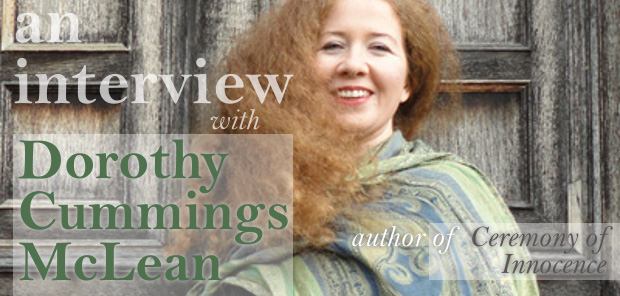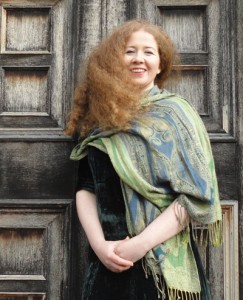
We sit down with the author of the new Ignatius novel Ceremony of Innocence, Dorothy Cummings McLean. A Canadian writer living abroad, she has been a regular contributor to The Catholic Register (Toronto). Her first book, Seraphic Singles, is a popular work of nonfiction. Until Wednesday, Ceremony of Innocence is also featured in our novel sale.
Ceremony of Innocence owes a debt to Graham Greene’s The Quiet American. Did Greene’s novel inspire you to write yours?
My novel is both a tribute and a parody to Greene’s novel. It’s a tribute to Greene’s amazing gifts as a storyteller and a parody of “Greeneland” in that it turns various elements of The Quiet American on their heads.
You have lived in Europe for many years. How have your experiences informed the story?
I didn’t move to Europe until after I had written the novel. However, the themes and setting of the novel spring from the summer I studied in Germany. I spent most of my time in Frankfurt-am-Main. I loved this city. It was energetic, cosmopolitan, and strangely beautiful. While I was writing, I would trace my characters’ peregrinations along a Frankfurt city map.
It was a lucky summer to be in Frankfurt because Germany was hosting the FIFA World Cup, and the German team exceeded all expectations. Suddenly it was as if the Germans had decided to be proud of Germany. Normally the Germans around me, even 22-year-old seminarians, acted as if Germany had the mark of Cain on its collective forehead. They complained about Germany endlessly, but heaven help you if you agreed. I was careful never to mention the last war—but they all did. My German friends call the Hitler years the national trauma.
The summer was lucky in other ways. While I was there, news broke that a gang of young Islamists had been arrested for planning terrorist attacks in my hometown of Toronto. I was beside myself with rage but also deeply thankful no one had been hurt. And a month later, news broke that two young Islamists had been arrested for planting bombs on trains leaving Cologne. The bombs had been left two days after I had visited Cologne—by train. They were foreign students and, as a fellow foreign student, I was disgusted.
In Joseph Ratzinger’s (Pope Emeritus Benedict XVI) book A Turning Point for Europe? he declares that the term “fundamentalist”, primarily associated with American Protestantism, does not really apply to current Islamist radicals, instead pointing to a fusion of Marxist and Islamic theories of liberation as being the undercurrent driving Islamist terrorism. So, despite being used as a weapon against the West, this form of terrorism has some roots in Western ideologies. Does this attraction to a kind of Marxist “liberation” play a part in the plot? Does it explain why a Westerner might be attracted to Islamist radicalism?
I think Westerners are attracted to Islamist radicalism because, to be blunt, they think it is sexy. It is strong, it is well-funded, it is exotic, and it claims to fight for the underdog. It also aligns itself with the religion of Islam, which is itself culturally strong and, thanks to the jaded Western palate, appeals to Orientalist sexual fantasies of masculine domination and feminine submission.
By contrast, Western culture divorced from Christianity and its own past is pallid, shallow, consumerist, and even distasteful, and that is the culture most Westerners of the post-Vatican II, post–mainstream Protestant era have grown up in. Unfortunately, millions of Europeans and Americans have been indoctrinated by the culture to believe that the Christianity of their ancestors is uncool and therefore bad. The victory of the counter-culture has also given rise to North America’s fratricidal culture wars and, where Islamism is concerned, “the enemy of my enemy is my friend.”
I am certainly concerned by what Western teenagers, especially in the English-speaking world, are taught about their ancestors and the histories of their countries or, rather, what effect it has on the teenagers. If the teenagers feel inspired to make their countries better places to live, good. If the teenagers despair and think Al Qaeda is justified, bad.
Meanwhile, I am very concerned about idealistic teenagers being sucked into causes by manipulative adults, no matter what the cause.
Despite the serious nature of the issues explored in Ceremony of Innocence, there is also a great deal of humor—much of it laced with irony. How does humor assist in storytelling?
Humour—pardon my Canadian orthography—does two things. It provides comic relief, and by contrast it sharpens the edges of the drama.
In Greene’s The Quiet American, the protagonist is male. And in most novels and films, the romantic pairings are usually between a man and a (sometime much) younger woman. But in your novel this scenario is reversed: a woman paired with a younger man. Do you think readers will react differently to situations based on this reversal?
Amusingly, the first thing a male reader said to me about Dennis was, “What does Catriona see in him?” I don’t think any male reader would ask what The Quiet American’s aging Fowler saw in the beautiful and docile Phuong. Meanwhile, no female reader would be surprised at Dennis’s open revolt against being treated like a beautiful object, whereas I was frustrated by Phuong’s silence. My guess is that female readers, especially older ones, will sympathize with Catriona’s attraction to Dennis, and that male readers will remember some attractive woman university lecturer or employer they had a crush on.
 Have you written fiction before?
Have you written fiction before?
I have written fiction, on and off, since I was six years old. I dabble quite a bit in magic realism and amusing experiments, like writing a Regency romance in the voice, and with the spelling, of an eight-year-old. Lately I have been writing ghost stories.
What authors would you say are your greatest influences?
In terms of literature, Graham Greene, of course, but also Gordon Korman, P.G. Wodehouse, Evelyn Waugh, and Ernest Hemingway. In terms of philosophy, St. Thomas Aquinas and, to a certain extent, Father Bernard Lonergan, S.J. and Professor Linda Hutcheon.
There is often a pessimistic point of view about the “Catholic Novel” today: the idea that there was a golden age around sixty years ago that is now forever gone. Do you think we will see a renaissance of Catholic writers? Are we seeing one?
The golden age of the Catholic novel is a myth. Before the Second Vatican Council, Catholics in English-speaking countries were still relatively culturally distinct from our Protestant and post-Protestant neighbours. We were more obviously excluded, and we more intentionally excluded ourselves. Therefore, when a media celebrity like G.K. Chesterton or Evelyn Waugh became a Roman Catholic, it was worldwide news and a shot in the arm for Roman Catholics. And in the era before television, more Catholics entertained themselves by reading books deemed suitable by priests and by attending lectures by Catholic notables. My father remembers his childhood Chicago congregation being exhorted from the pulpit to read Thomas Merton’s The Seven Story Mountain (1948).
This all changed after the Second Vatican Council, which coincided with the 1960s and greater Catholic assimilation into mainstream society. Today there is much less attention in the Church to celebrity converts—unless they are world leaders like Tony Blair—and there is more confusion over what it means to be Catholic and which novels can be properly called “Catholic novels”. The best-selling, award-winning Catholic novelist alive in the UK today is probably David Lodge, but I don’t think anyone would call David Lodge an orthodox Catholic or his recent books “Catholic novels”.
In short, Catholics are still writing novels and winning awards, but Catholics are less aware of this and care less, too. The best hope for a Catholic literary renaissance is for Catholics to read more novels by Catholics. This will only come about if priests and Catholic media get Catholics interested in contemporary Catholic literature—and not just apologetics—again.
Your book deals quite frankly with issues such as cohabitation, drug use, and other issues that are thought of rather casually in secular circles, but are often deemed taboo subjects for pious Catholic audiences. What do you think is the balance that must be struck when dealing with these topics?
Evelyn Waugh and Graham Greene, considered among the greatest of the 20th century Catholic novelists, wrote about cohabitation, drug use, adultery, prostitution, and homosexuality. They did not, however, celebrate these things or show them in a glamorous light—although Waugh was certainly sympathetic to homosexuals and Greene to prostitutes. Waugh and Greene also stayed on the right side of the law, and obscenity laws were stricter in their time than our own.
Even among Catholics, taboos change from country to country and perhaps from parish to parish—or from Catholic to Catholic! All I have to go by is a conscience informed by the Church and my vision as a writer. I would not want to depict drug abuse as desirable, for drug abuse is not desirable. I would not write explicitly about sex, for it might sexually arouse my reader, to whom I am not married. Writer and reader together create the world in which the reader immerses himself; I might want my reader to come out of it changed, but I do not want him to come out of it harmed.
Issues such as repentance and conversion are usually dealt with rather obliquely in the works of such authors as Evelyn Waugh and Graham Greene, yet they are sometimes placed front and center in modern religious fiction. What are your thoughts on how to treat these themes?
The besetting temptation for a religious novelist is propaganda. Propaganda is the great slayer of art. It acts like gravel in the gas tank. And the sad thing for the Catholic would-be novelist who writes propaganda for Catholicism is that he of all people should know that there is no need. We have been given the fullness of truth, and all we have to do is write about the world from that perspective. Grace moves though nature; if you can see it, write about it. But don’t wrap either nature or Grace in cotton candy. Tell the truth.
Thanks for your time! If readers want to follow your writing, where else can they find you online or in print?
I write a biweekly column for the Toronto Catholic Register, and will start a new blog soon for readers of Ceremony of Innocence.
[We are glad to say that Dorothy will be blogging right here at the Novel Thoughts blog! Stay tuned, and sign up for the newsletter. You can read up on and order Ceremony of Innocence here. —ed.]






Sheila
October 16, 2013 at 8:29 am
“Propaganda is the great slayer of art. It acts like gravel in the gas tank.” Absolutely true, I love this. Sounds like Flannery O’Connor’s view of Catholic art: write the truth, since the faith is true it will shine through.
That definitely makes me want to buy this book! I don’t usually want to buy Catholic fiction because it might just be a morality tale instead of good art. But Ceremony of Innocence sounds great! I’ve added it to my wishlist; hopefully my husband will get it for me for Christmas.
Megan
October 16, 2013 at 1:27 pm
“Ceremony of Innocence” is one of the greatest modern novels I’ve read. Thank you, Dorothy, and thank you, Ignatius Press, for making this work available!
T. Chan
October 16, 2013 at 3:31 pm
Waiting for her to come out on a book tour!